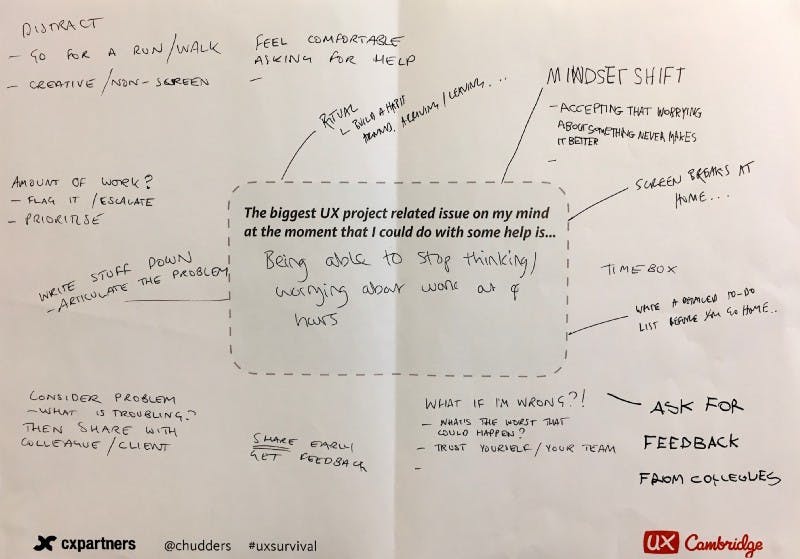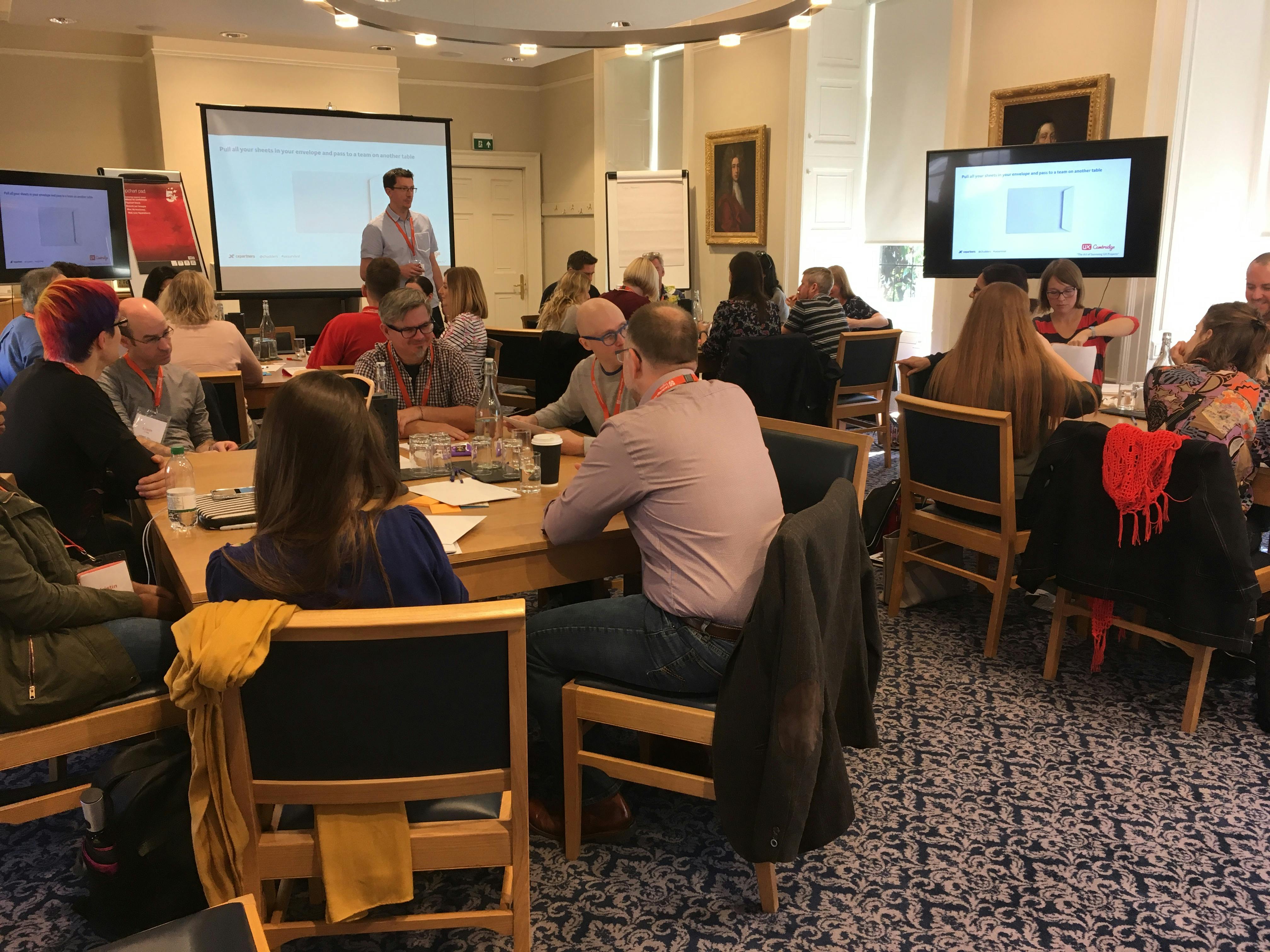A new workshop format to help groups of people solve each others problems
I think we can apply the problem solving skills that we use in our work to help us overcome the day to day challenges we encounter as design professionals.
I’ve come up with a workshop format where everyone anonymously shares their biggest professional challenges with a group of fellow professionals who then work together to suggest ways to tackle them.
The format quickly generates lots of practical ideas and also helps to encourage a culture of teams working together to share their knowledge to overcome their challenges.
I ran this workshop recently at UXCambridge and was really pleased to hear that some of the attendees were planning to run it within their own organisations when they got back to work.
I thought it would be useful to share how it works so you can give it a whirl yourself.
Kick off the workshop by making these points:
- We all do similar jobs so it stands to reason that we all encounter similar problems in our working lives.
- Our profession is maturing so it is likely that our own challenges are not unique and our peers are likely to have already developed methods to overcome them.
- In this workshop everyone shares their professional problems and challenges anonymously with everyone else. Collectively we’ll work collaboratively to suggest ideas to overcome them.
- Let’s make a pact to help one another out and make our working lives easier.
Let people know why this is important:
- Stories of stress, burnout and mental health issues are common within the creative industries. We need to get better at looking after our health and wellbeing in our professional lives and looking after each other.
- Design can be a chaotic, stressful and unpredictable industry to work within. Things go wrong on every project you work on so you need to develop coping strategies to help you to roll with the punches.
- As our industry matures it makes sense to share the knowledge we learn to help us overcome the challenges we face as we progress within our careers.
Communicate the overall objective of the exercise:
- For everyone to leave the workshop feeling like they have some practical and useful advice to help them to tackle a challenge they are facing at work.
Stationery you’ll need:
- A3 envelopes (enough for 1 per team)
- Enough A3 ‘problem sheets’ for one per person : (Download problem sheet PDF)
- Pens
Step 1: Set the scene
Split the room up into small teams of 4 or 5 people and ask people to introduce themselves to one another. If you know the people in the room, make sure you’ve got a nice mix of skills/ experience within the teams.
Ask each team to think of a team name and ask them to write it on their A3 envelope.
Now help attendees understand what they will be working towards by showing the following image.

The idea is that everyone will leave with their own completed ‘problem sheet’ containing their problem/ challenge in the middle surrounded by loads of great ideas from everyone in the room.
Step 2 : Writing problems
Give everyone 5 minutes to write down the problem that they want help with on their ‘problem sheet’.
I think doing this anonymously is important.
Anonymity doesn’t matter too much within a conference setting as people generally don’t know each other but if you run this with a group who know one another it makes sense to keep it anonymous.
I’ve shared examples of the sorts of things that have come up before to help people understand the sorts of things I’m after. These have worked well as prompts for people who may not have anything that is on their mind.
Useful prompts to get people thinking include:
- I can’t stop thinking about work outside of work
- How can I make more user research happen on my projects?
- I find keeping up with the industry really difficult
- How can I keep my hand in as a practitioner as my role becomes more managerial?
- How can I stay motivated during long projects?
- How can I improve communication between my globally distributed team?
Step 3 : Sharing and solving problems
Ask each team to put all of their problem sheets into their envelope.
Get teams to swap envelopes and give them 5 mins per problem sheet to come up with as many ideas to solve that problem as possible.
Stand back and watch the magic happen as people come up with loads of ideas.

Step 4 : Presenting back
Ask each group to choose one of the problems they’ve been solving and present all of the solutions they’ve come up with back to the room.
Now ask the whole group to suggest more ideas to help solve the problem. People can just call stuff out and make sure they get documented on the problem sheet too.
Repeat this exercise with each of the teams.
One flaw with my method is that every problem doesn’t benefit from the wisdom of the whole room.
You could repeat this for each individual problem sheet if you’ve got a small group but it’s unlikely to be practical for larger groups.
One idea I had to address this was to get everyone to stick their sheets on the wall and let people add ideas in their own time. Actually thinking more about this it would be cool to display them somewhere with high footfall and let people add more and more ideas over time.
Step 5 : Re-uniting people with their (now solved) problems
This bit is lovely and actually provides a real moment of delight that I never originally anticipated.
Ask groups to put all of the solved problems into the envelopes, seal them and re-unite them with their owners.
Stand back and watch people rip open their envelopes and read all of the ideas that people have come up with to help solve their problems!
That’s it, end of workshop. Simple eh?!
What have I learnt from running this workshop?
As is generally the case you run these things thinking you’ll learn one set of things and then end up with a load of unexpected learnings such as:
I hadn’t anticipated was how this exercise generates such a strong and positive feeling of goodwill, collaboration and general positivity within the group.
- UX’ers are good bunch for this format because they are great at problem solving and (generally) like people so this format suits them well. There is nothing UX specific to the workshop though, you could run it with a bunch of butchers or a posse of postmen.
- I think this workshop could help groups of people work more effectively together who haven’t collaborated well in the past.
Best of luck with it if you give it a go and do contact me if you’d like some help running this within your own organisation.

